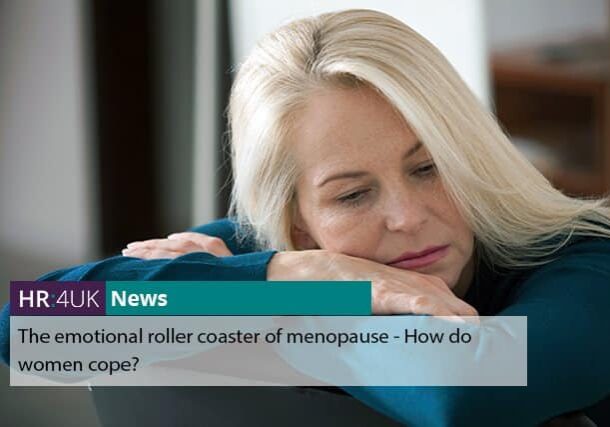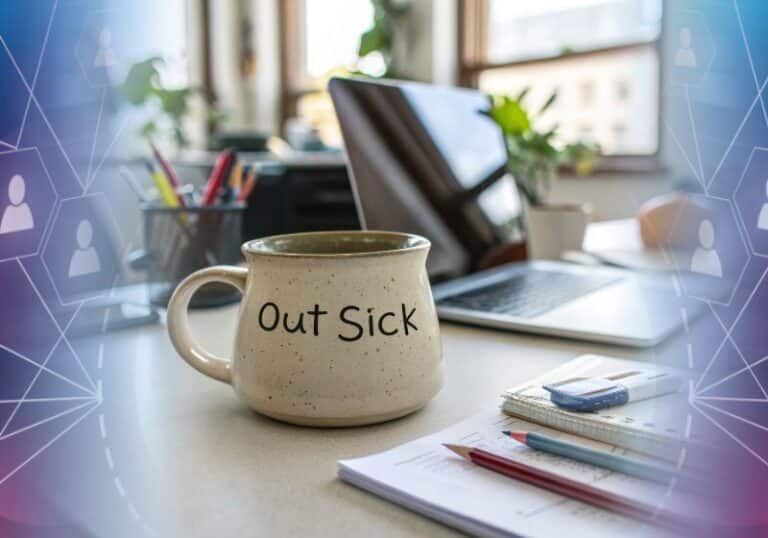The emotional roller coaster of menopause – How do women cope?

If we don’t address the stigma, how can we expect to change the perception? On that note, let’s talk about menopause…
We would like to thank Heather, our HR Advice Manager, for sharing her personal story so candidly, and allowing us to incorporate quotes within this article. Please click here to read Heather’s full story.
Outline of Menopause
Menopause is a natural part of aging whereby a woman stops having menstrual cycles. This process does not occur overnight: periods usually start to become less frequent over a few months or years before they stop altogether, so be prepared for the long haul. Menopause can be triggered naturally, or, there is a surgical menopause which means the symptoms will be full blown following a hysterectomy.
Perimenopause, on the other hand, means ‘around menopause’ – this is a transitional stage whereby the ovaries produce less of the main female hormone, oestrogen. Perimenopause is different for every woman and can last for anytime between a few months and four years. During this transition stage, periods can occur at any time: it’s a poor guessing game but when they do come, women can expect heavy flows and menstrual clots. It really isn’t a great feeling to be at work, in a meeting, scared to death of standing up… the joys of being a woman.
Within the UK, the average age for a woman to reach menopause is 51, however, it can start as early as mid-30s to as late as mid-50s. A proportion of women, 1 in 100, experience premature menopause which occurs before the age of 40.
Menopause is just a period of hot flushes, right?
Wrong.
“The intensity of the hot flushes grew from days to nights, along with the chronic fatigue, severe anxiety, brain fog and mood swings – the list went on and on. I thought this can’t be menopause, nobody told me this.”
To think menopause is just a period of hot flushes is unfortunately a very simplistic and ignorant view. Whilst hot flushes certainly are one, there are a myriad of symptoms including:
- Depression
- Memory loss
- Anxiety
- Muscular aches
- Hair loss
- Urinary incontinence
- Insomnia
- Lack of confidence
- Low morale
And many, many more…
Treatment
According to the NHS, the main treatment for menopausal symptoms is Hormone Replacement Therapy (HRT) which can be prescribed by a GP. HRT works by replacing hormones including oestrogen, and can be prescribed as tablets, skin patched, gel or implants. Menopausal symptoms can be so severe women find themselves in a state of desperation, “positively demanding” any treatment which may help.
It is important to note however, that there are risks and benefits associated with HRT and each person will need to do their research and make an informed decision for themselves. Whilst the treatment has the ability to alleviate menopausal symptoms, there is the possibility of increasing the risk of strokes, blood clots, heart attacks and breast cancer- a side effect Heather, our HR Advice Manager experienced, “At 47, I discovered a lump in my breast, ‘Please no,’ I screamed inside. ‘It can’t be…’ And then they relayed the news, “You have stage 3 breast cancer and it’s aggressive.”
Campaigners have pushed to make HRT treatment free in England. In response, the government have proposed that HRT prescriptions will be made available on an annual basis which will reduce costs by between £90 and £200 per year. That being said, research is ongoing into new alternative treatments on the market.
The emotional implications of menopause for the employee
Breathing a sigh of relief because periods are finally over can be pure misjudgement.
Menopause can feel like a never ending period … with no light at the end of the tunnel which is why, “There is a desperate need for support during menopause whether that be surgical or not. These symptoms are real, they have an adverse effect on your ability to lead your life.”
As an employer, how can I help? What can I do?
The symptoms won’t change, so why don’t we be open and honest and consider what would really help?
Workplace support has the ability to alleviate some of the stressors associated with menopause to ultimately provide a comfortable working environment. So, what can employers do to educate their teams on this once taboo subject to make a difference?
In the first instance:
- Purchase desk fans – these can make a significant impact
- Talk about it – quash the stigma
- Introduce a Menopause Policy for all staff to aid understanding
- Appoint an individual as a Menopause Mentor who is understanding, approachable and can be instrumental in offering advice (not necessarily sympathy)
- Some reasonable workplace adjustments e.g. flexible working hours, hybrid working
Why not also consider holding a menopause awareness campaign? Statistically, 42% of menopausal women will consider leaving the workplace, 10% will leave and many others will suffer in silence as they fear the subject cannot be approached. Women make up 47% of our workforce, and approximately 3.5 million are aged 50 and over. It’s time we all used our voices to raise awareness of this incredibly important topic. Together, we are stronger.
Whilst the objective of this article is to be informative and personal, addressing the symptoms and ways an employer can help alleviate the associated stressors, we are extremely mindful that this can be a very sensitive topic.
Please find below a list of services you can reach out to:
- Menopause Matters
- Macmillan Cancer Support
- Support line – 0808 808 00 00
Angela Clay
A qualified employment law solicitor and our managing director, Angela has unparalleled legal expertise and decades of experience and knowledge to draw from. She’s a passionate speaker and writer that loves to keep employers updated with upcoming changes to legislation, and is a regular guest speaker on BBC Leicester Radio.




